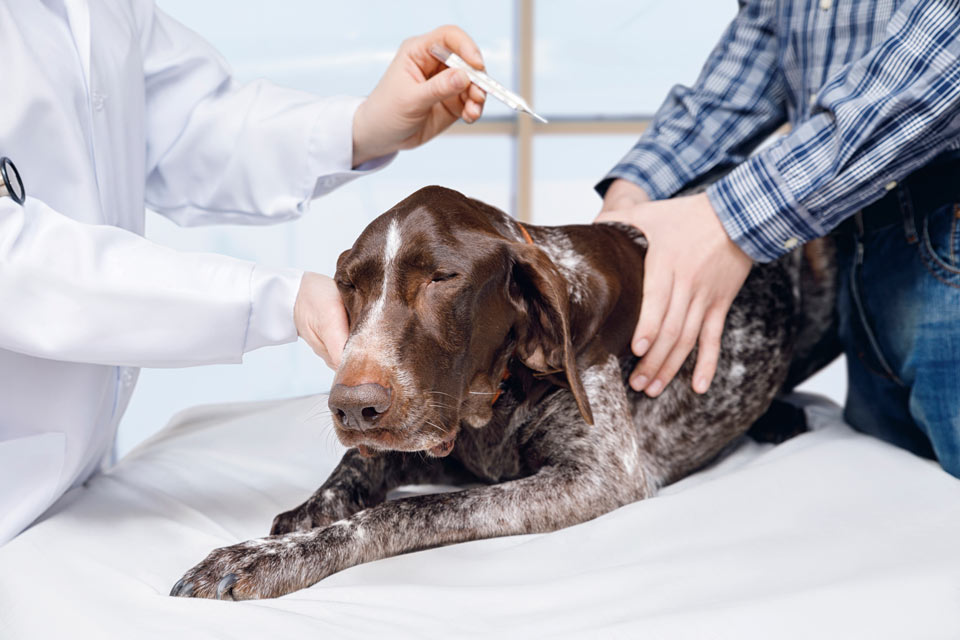Septic Shock in Dogs

Septic shock is the end stage of sepsis in dogs. Sepsis is a widespread, systemic inflammatory response to an infection.
During septic shock, circulatory collapse leads to life-threatening heart, respiratory, and organ failure.
Causes and Course of Septic Shock in Dogs
Septic shock occurs as a result of sepsis, which is a widespread, systemic infection. A bacterial infection is the most common cause of sepsis and, later, septic shock.
Septic shock occurs when there is so much toxin circulating in the bloodstream from an infection, along with inflammatory cells from the immune system, that the circulatory system is overwhelmed and collapses. That leads to multi-organ failure.
The causes of sepsis and, subsequently, septic shock in dogs can include:
- Ruptured intestine (from foreign body or cancer)
- Other ruptured organs such as the bladder (from obstruction) or stomach (from GDV)
- Pancreatitis or abscess in the pancreas
- Prostate infection or abscess in a male dog
- Pyometra (uterine infection) in a female dog
- Infection of the heart valves (endocarditis)
- Blood infection (secondary to surgery or a wound)
- Immune suppression from a condition such as diabetes mellitus or chemotherapy
Signs of Septic Shock in Dogs
When a dog is experiencing septic shock, the signs progress or cascade.
During early septic shock, signs include:
- Increased heart rate
- Bright red mucous membranes
- Fever
- Increased respiratory rate
- Not eating
- Vomiting
- Drooling
- Dehydration
During late septic shock, as the body is losing the ability to deal with the situation, signs include the above and also:
- Decreased heart rate
- Difficult to find pulses in the extremities
- Cold paws
- Pale mucous membranes with low refill time (decreased CRT) and, often, bright red spots (petechiae) interspersed
- Fever or decreased (in the end stage) body temperature
- Depression
- Difficulty breathing and fast respiratory rate
- Swelling of the limbs (edema)
- DIC
- Collapse
- Death
Additional signs related to the primary condition that caused the sepsis may also be present.
Diagnosis of Septic Shock in Dogs
A complete blood count (CBC) done on a dog with sepsis will show increased white blood cell counts and possibly signs of toxicity in those cells. Indications of dehydration may also be present in the CBC. Low platelet levels are also commonly seen during this condition.
Clotting values will be abnormal if DIC has been triggered.
Low blood albumin (protein) levels may be present during septic shock, and there will likely be high liver and kidney values.
X-rays, ultrasound, bodily fluid analysis, urinalysis, and other testing may help diagnose the underlying cause of the sepsis.
Treatment of Septic Shock in Dogs
Septic shock is an emergency, life-threatening condition that must be treated in a veterinary hospital. The following treatments may be necessary:
- Aggressive IV fluid therapy
- Oxygen therapy
- Plasma transfusions
- Medications to raise blood pressure
- Antibiotic treatment
- Pain medication
- Anti-vomiting medication
- Surgery
Once septic shock has set in, it carries a poor prognosis. Up to 65% of dogs with septic shock will die. Aggressive veterinary treatment as soon as possible gives a dog the best chance to recover.
You May Also Like These Articles:
Immune-Mediated Thrombocytopenia in Dogs
Disclaimer: This website is not intended to replace professional consultation, diagnosis, or treatment by a licensed veterinarian. If you require any veterinary related advice, contact your veterinarian promptly. Information at DogHealth.com is exclusively of a general reference nature. Do not disregard veterinary advice or delay treatment as a result of accessing information at this site. Just Answer is an external service not affiliated with DogHealth.com.
Notice: Ask-a-Vet is an affiliated service for those who wish to speak with a veterinary professional about their pet's specific condition. Initially, a bot will ask questions to determine the general nature of your concern. Then, you will be transferred to a human. There is a charge for the service if you choose to connect to a veterinarian. Ask-a-Vet is not manned by the staff or owners of DogHealth.com, and the advice given should not delay or replace a visit to your veterinarian.



